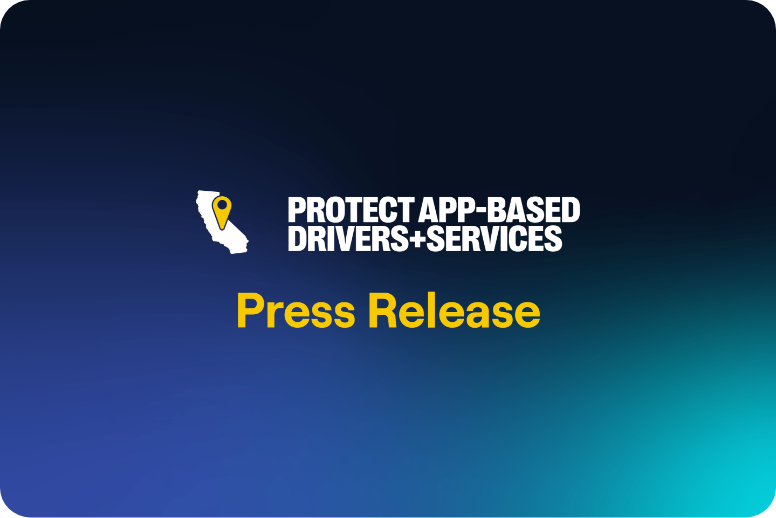Date: October 15, 2021
Contact: Geoff Vetter (916) 634-9051
[email protected]
Industry Data Shows Los Angeles County Price Control on App-Based Delivery Services Resulted in Higher Consumer Costs, Fewer Customers for Restaurants, and Lower Driver Earnings
Sacramento, CA – Today, the Protect App-Based Drivers & Services Coalition, which includes app-based platforms DoorDash, Uber Eats, Instacart and Lyft, released findings from internal company data that proves local municipal fee caps on app-based restaurant delivery services are bad for customers, restaurants, drivers and municipal budgets.
- Increased Costs for Consumers: In cities and counties that have passed arbitrary fee caps, delivery costs have increased almost immediately for consumers by $2-3 per order. Consider that on the typical $20 order, a 20% fee cap leaves only $4 to go towards compensating the delivery driver, as well as marketing for the restaurant, customer service, driver insurance, technology and other expenses associated with operating app-based delivery platforms. That’s simply insufficient, and as a result, customer costs must increase to keep these services viable.
- Fewer Customers for Restaurants and Small Businesses: Higher consumer costs leads to fewer customers. In fact, most cities have experienced 5-10% reductions in delivery orders after fee caps were enacted, and several cities have seen demand decrease by as much as 30%. The last thing we should be doing is reducing customers for restaurants struggling for a lifeline due to the pandemic.
- Reduced Earnings for Drivers: Los Angeles County app-based delivery drivers could lose more than $9 million in earnings every year, according to industry data. Higher prices mean fewer orders and reduced earnings for drivers.
A recent report showed that app-based delivery services have been the difference between restaurants remaining in business or having to close permanently during the pandemic. Between March 2020 and February 2021 (the first year of the pandemic) app-based platforms generated more than $9 billion in revenue for more than 117,000 restaurants, grocers, retailers and small businesses in California, helping many stay open and in contact with their customers.
“While a cap on fees may sound like a good idea, it would actually make things worse for many restaurants at this time,” said Lilly Rocha, CEO/Executive Director of the Latino Restaurant Association. “While we are still analyzing the reasons for the current labor shortage, it is very real and very intense. Restaurants are still in full ‘recovery mode’ and driving up customer costs will reduce customer demand and cut into the vital delivery business that many restaurants depend on. Without access to the app-based delivery platforms that have essentially become an extension of the current restaurant staffing, a majority of restaurants will have to lay off staff or shut down entirely as we struggle to regain our losses from the pandemic.”
Restaurants choose to partner with app-based platforms and contracts are fully transparent. Every restaurant or merchant that signs a contract with an app-based delivery service has full knowledge of the terms, fees, and benefits of partnering with these platforms. Commission fees help pay for marketing and advertising that helps restaurants gain new customers, as well as technology, credit card processing fees, and most importantly, payments to delivery drivers.
About Protect App-Based Drivers & Services (PADS) Coalition
The Protect App-Based Drivers & Services (PADS) Coalition, formerly the Yes on Prop 22 coalition, is continuing to engage to ensure the will of California voters is upheld; to protect access to independent, app-based jobs; and to preserve the availability, affordability and reliability of on-demand app-based rideshare and delivery services that are essential to Californians and our economy.
Proposition 22, which was supported by nearly 60% of California voters, 120,000 drivers, and a diverse coalition of more than 140 groups including social justice, senior, community, business, veterans and many others, provided app-based rideshare and delivery drivers historic new benefits and protections, including an earnings guarantee of 120% of minimum wage plus 30 cents per mile, access to healthcare benefits, occupational accident insurance, and empowered drivers to earn more income while maintaining their independence, freedom, and the ability to work when, where, and how long they want.
The Latest News

Opinion
I’m an Instacart driver: California Supreme Court must protect my job
By Stephanie Whitfield It may sound dramatic to say that app-based driving saved my life, [...] Read more
News
As Prop. 22 heads to California Supreme Court, support doesn’t break along ideological lines
By Bob Egelko Proposition 22, the 2020 ballot initiative sponsored by Uber and Lyft that [...] Read more